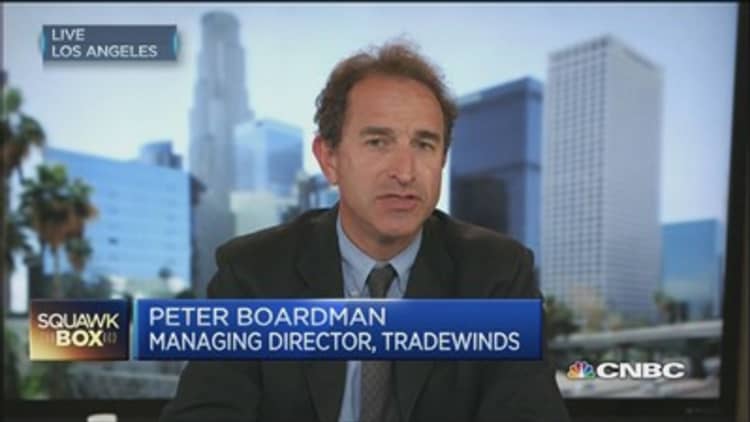
Reports the Bank of Japan (BOJ) is preparing to lower its inflation outlook could push the yen to its lowest level in 13 years, analysts say.
"Pushing out your inflation targets for a couple of years probably just means the yen will stay on this weakening trend," Trading Partners managing director Peter Boardman told CNBC. "[The yen] might go to 130-140 [against the U.S. dollar] in the future," levels not seen since the post-dotcom bust in 2002.
Two years after pledging to drag Japan out of a twenty-year deflationary spiral with a huge quantitative easing (QE) program, the BOJ's self-imposed two-percent inflation target remains out of reach.
With the central bank's bi-annual economic outlook review due next Thursday (April 30), the Nikkei reported that BOJ board members are discussing whether to downgrade their inflation forecasts for the next three years.
Read MoreWhy a weakeryen is not driving up prices: Goldman
The board could cut its inflation outlook for fiscal 2015 to the lower zero percent range, according to the report. Data for February, the last available, showed the country is flirting with deflation: the core consumer price inflation, the BOJ's preferred gauge, came in flat year-on-year.
"Admitting that it can't meet the target will pile pressure on the BOJ to ease monetary policy again," Dai-ichi Life Research Institute (DLRI) senior economist Koichi Fujishiro told CNBC by phone.
"When it does, the yen will likely fall by 5 yen against the U.S. dollar and fall to 130 yen by the end of 2015," he said. Fujishiro expects the BOJ to ease in July.
The yen was trading at 119.68 against the U.S. dollar in early Asian trading time. The Japanese currency has weakened by 26.7 percent since the BOJ launched it first round of QE in early April 2013.
Oil and credibility
With inflation set to dip into negative territory anytime over the coming months, Tokyo's BOJ watchers have been speculating when Governor Haruhiko Kuroda would bow to the inevitable and admit the original target would be missed.
The reported lower-zero percent range for fiscal 2015, which runs to the end of March 2016, is more realistic, said DLRI's Fujishiro.
For one, oil prices appear to be limping back from six-year lows hit over the past few months. As long as oil prices are above the levels seen at the same month last year, inflation should rise on an on-year basis, he noted.
The problem for the BOJ is that it used the threat of the collapse in oil prices to justify last October's pre-emptive expansion of its quantitative easing program to 80 trillion yen. The BOJ will be expected to ease monetary policy again to maintain its credibility if oil is not to blame, analysts said.
"If cheap oil is not to blame for the absence of inflation, the BOJ will be expected to demonstrate its commitment to generating inflation by easing again," said Fujishiro.

